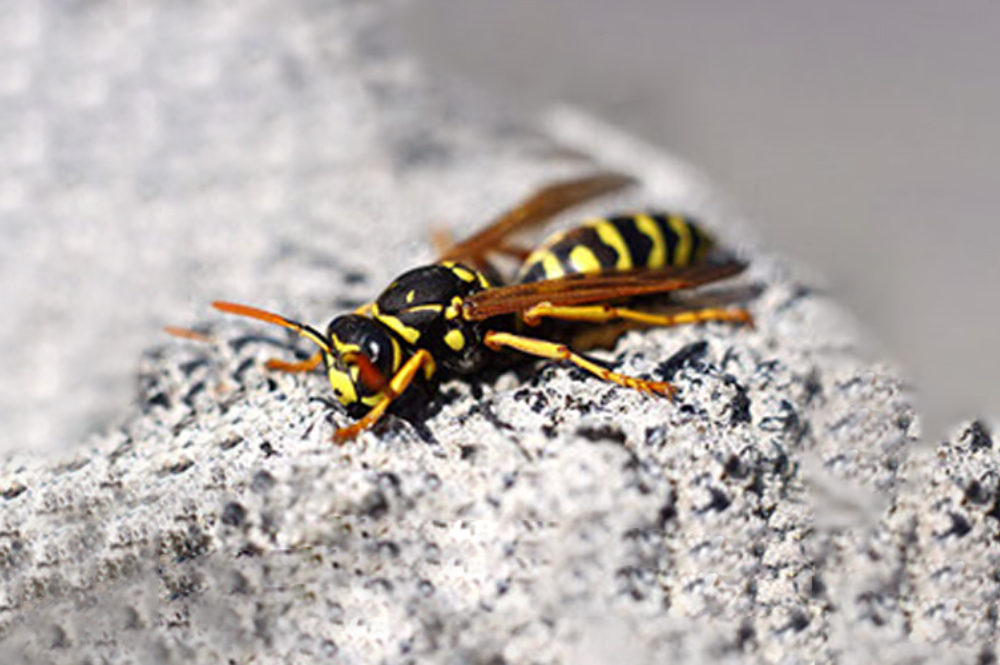Encounters with Arizona wasps, such as the familiar paper wasp, spider wasp, or the aggressive yellow jacket, can be particularly concerning for those with insect venom allergies in this sunkissed state.
Understanding these buzzing inhabitants can be helpful for your security and nerves when exploring the outdoors—this guide will equip you with the knowledge to manage and prevent unwelcome wasp encounters effectively while appreciating their role in our ecosystem.
If you have a serious wasp infestation in your home or business that you can’t manage with DIY methods, Victory Pest Defense is here to help. Contact us today for a free quote, and start living sting free!
Common Types Of Wasps In Arizona
Wasps are incredibly common in the hot, bug-filled climate of Arizona. Due to all of the insects that make Arizona its home, wasps here have plenty of options for cuisine. Here’s a snapshot of some wasps that are commonly found in Arizona:
- Paper Wasps
- Nesting: Paper wasps create aerial nests from wood fibers mixed with saliva, resembling paper.
- Behavior: These wasps aren’t typically violent, but can be provoked like any other stinging pest.
- A Variety of Paper: The yellow paper wasp, Navajo paper wasp, and Arizona paper wasp can all be found in Arizona’s hot deserts.
- Spider Wasps
- Hunting: Known for paralyzing spiders, including tarantulas, to provide food for their larvae.
- Notable Species: The tarantula hawk, with a sting considered one of the most painful.
- Yellow Jackets
- Nesting: Build nests in secluded spaces like hollow trees or underground, using abandoned burrows or voids in structures.
- Behavior: Small and notably aggressive, especially when food sources are scarce.
- Diet: Scavengers of meats and sweets, which can lead them to human activities.
Remember, these wasps are protective of their nests and can be aggressive if disturbed. It’s always best to observe from a distance and contact pest control professionals if you need assistance with wasps in Arizona.
The Role Of Wasps In The Ecosystem
Arizona wasps, often perceived as mere nuisances, actually play several pivotal roles in maintaining the delicate balance of our ecosystem. These insects are far more than potential threats to your outdoor activities; they are unsung heroes in the garden and beyond. Here’s how:
Pest Control Agents
- Wasps are natural predators, feeding on a variety of pest insects, including caterpillars, moths, flies, and beetles.
- By controlling these populations, wasps help protect crops and ornamental plants from damage.
- For example, yellow jackets target house fly and blow fly larvae, which are common pests in both urban and rural settings.
Pollinators and Agricultural Allies
- While bees are renowned for pollination, wasps also contribute to the reproduction of many plant species.
- Some, like the Mexican honey wasp, can make honey and pollinate plants, enhancing biodiversity and crop yields.
- Wasps visiting vineyards aid in the pollination of grapes, which is not only crucial for the ecosystem but also benefits the wine industry.
Arizona wasps are interesting bugs. Filled with anger and venom, they’re actually really helpful to their local ecosystems as both pollinators and predators.
Wasp Control Methods & Prevention
Managing encounters with Arizona wasps requires a proactive approach to ensure your safety and maintain the delicate balance of our ecosystem. Here’s how you can minimize conflicts with these winged inhabitants:
Remove Attractants And Seal Entry Points
- Food Sources: Keep outdoor eating areas clean, cover food and drinks, and dispose of garbage properly to avoid luring wasps.
- Fruit Trees: Pick ripe or rotting fruit promptly to prevent wasps from feasting in your yard.
- Home Maintenance: Seal cracks and crevices in buildings, repair damaged screens, and cover openings to deter wasps from nesting.
Professional Assistance And Regular Inspections
- Local Experts: If you suspect a wasp infestation, contact a local pest control technician, especially in areas like Gilbert, Scottsdale, and Mesa.
- Regular Checks: Schedule home inspections to detect early signs of wasp activity and address them promptly.
Safe Nest Management
- Professional Removal: For established nests, especially those of yellow jackets and tarantula hawks, enlist professionals like Eco Valley Pest Control for safe removal.
- Preventive Measures: Consider non-toxic options such as essential oils to deter wasps, and knock down incomplete nests when safe to do so.
By taking these steps, you can enjoy Arizona’s outdoors with fewer worries about unwelcome wasp encounters.
Conclusion
If you need assistance maintaining that delicate balance between respecting these winged creatures and protecting your personal space, Victory Pest Defense is here to protect you from the wasps of Arizona.
Take a step towards ensuring a sting-free environment, and contact us today if you need help!
